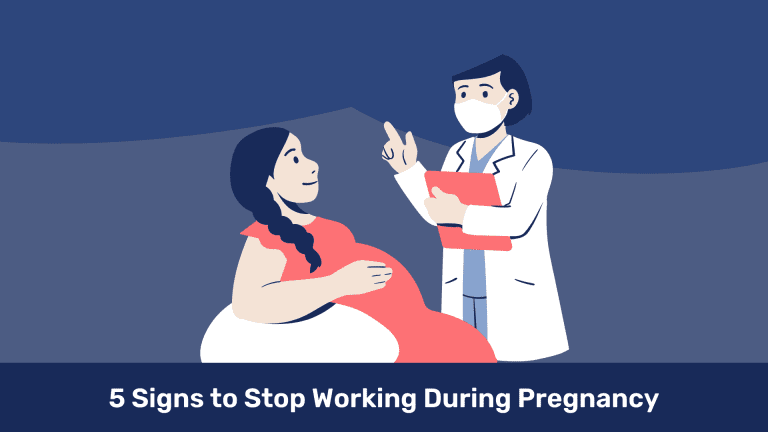Introduction
Working while pregnant is a significant aspect of modern women’s lives, as they strive to balance their professional careers with the life-altering journey of pregnancy. This delicate balance necessitates careful consideration, as the health and well-being of both the expectant mother and her developing fetus are paramount. In this context, understanding the implications of working during pregnancy is crucial.
Statistics on Pregnancy and Employment:
Before delving into the intricacies of working during pregnancy, it is essential to acknowledge the prevalence of this phenomenon. Statistics illuminate the pervasive nature of women continuing to work throughout their pregnancies:
- Labor Force Participation: According to data from the U.S. Bureau of Labor Statistics, the labor force participation rate among pregnant women in the United States has steadily increased over the years. As of the last available statistics in 2020, approximately 67.5% of women who were pregnant were part of the labor force, up from 47.4% in 1980. This data underscores the increasing importance of understanding the implications of working during pregnancy.
- Occupational Diversity: Pregnant women can be found in virtually every sector of the workforce, ranging from physically demanding jobs to sedentary office positions. It is vital to recognize that the challenges and considerations associated with working during pregnancy can vary significantly based on the nature of one’s job.
- Maternity Leave: Globally, the availability and duration of maternity leave vary considerably. In some countries, there are robust legal provisions for paid maternity leave, while in others, such provisions may be limited or non-existent. These variations contribute to the choices women make regarding their work status during pregnancy.
- Healthcare Access: Access to quality healthcare during pregnancy is another critical factor influencing a woman’s ability to work. Regular prenatal care and medical advice play a crucial role in determining whether a pregnant woman can continue working safely.
As we explore the complex dynamics of working while pregnant, it becomes evident that there is no one-size-fits-all approach. Factors such as a woman’s health, the nature of her job, legal protections, and societal expectations all intersect to shape her decision-making process.
This discussion will delve into the multifaceted aspects of working during pregnancy, addressing the potential benefits, challenges, and most importantly, the key signs to stop working during pregnancy or to consider modifications to her work routine in her employment. Making informed decisions regarding work during pregnancy is essential for both the expectant mother’s well-being and the healthy development of her child.
Is Working While Pregnant Safe?
The safety of working during pregnancy is a subject of paramount concern for expectant mothers, their families, and employers alike. While the decision to continue working or take a break during pregnancy is highly individualized and dependent on numerous factors, it is essential to explore the topic comprehensively to understand the associated risks, benefits, and considerations.
Benefits of Working While Pregnant:
- Financial Stability: Maintaining employment during pregnancy often provides a sense of financial stability for expectant mothers and their families. Income from work can help cover medical expenses, prenatal care, and the overall cost of preparing for the baby’s arrival.
- Health Insurance: Many jobs provide health insurance benefits, which can be invaluable during pregnancy. Access to quality healthcare is essential for monitoring the mother’s and baby’s health, and employer-sponsored health plans can ease the financial burden of medical expenses.
- Social and Psychological Well-being: For many women, work is not merely a source of income but also a significant aspect of their identity and social life. Continuing to work can provide a sense of purpose, social interaction, and emotional well-being, which are crucial during the emotionally charged period of pregnancy.
- Professional Growth: Some women may be in career stages where taking a break or leaving the workforce temporarily could hinder their professional development. Staying employed allows them to maintain their career trajectory.
Risks and Considerations:
- Physical Demands: The safety of working during pregnancy largely depends on the nature of the job. Jobs with physically demanding tasks, exposure to harmful substances, or excessive stress may pose increased risks to both the expectant mother and her baby. In such cases, it may be advisable to seek workplace modifications or consider temporary leave.
- Stress and Mental Health: High levels of stress at work can have adverse effects on pregnancy. Stress has been associated with preterm birth and low birth weight. Pregnant women in stressful work environments should consider discussing possible accommodations with their employers.
- Prenatal Care and Rest: Pregnancy requires regular prenatal care, and working long hours or under stressful conditions may make it challenging to attend these crucial appointments. Additionally, adequate rest and sleep are essential during pregnancy, and working excessive hours can lead to fatigue and potential health risks.
- Legal Protections: Many countries have laws and regulations in place to protect pregnant employees. These laws often require employers to make reasonable accommodations to ensure a safe and healthy work environment for expectant mothers. Familiarizing oneself with these legal protections is essential for pregnant workers.
Key Considerations for a Safe Work Environment During Pregnancy:
- Open Communication: Expectant mothers should maintain open and honest communication with their healthcare providers and employers. Discussing any concerns or discomforts related to work is essential in finding appropriate solutions.
- Workplace Accommodations: Employers should be willing to make reasonable accommodations, such as adjusting work hours, providing a safer workspace, or allowing more frequent breaks, to ensure the well-being of pregnant employees.
- Self-care: Pregnant women must prioritize self-care, which includes proper nutrition, hydration, rest, and stress management. Setting boundaries and seeking support from family and colleagues can also contribute to a healthier pregnancy.
The safety of working during pregnancy is contingent on various factors, including the type of job, individual health, and available support systems. While many women can continue working safely throughout their pregnancies, it is crucial to assess each situation individually, considering both the potential benefits and risks.
Consulting with healthcare professionals and working collaboratively with employers can help pregnant women make informed decisions that prioritize their health and the health of their unborn children.
Effects of Work Stress During Pregnancy
Pregnancy is a unique and transformative period in a woman’s life, filled with physical, emotional, and psychological changes. While work can be a fulfilling and necessary aspect of life during pregnancy, it can also introduce various stressors that have potential implications for both the expectant mother and her developing baby. Understanding the effects of work-related stress during pregnancy is crucial for women, employers, and healthcare providers.
-
Physical Health Effects:
- Preterm Birth: High levels of stress during pregnancy have been associated with an increased risk of preterm birth, which can lead to a range of health issues for the newborn. Preterm babies may face developmental delays, respiratory problems, and a higher risk of infection.
- Low Birth Weight: Stress can also contribute to low birth weight, another risk factor for various health complications in infants. Low birth weight babies may experience difficulty regulating body temperature, feeding issues, and an increased likelihood of long-term health problems.
- Hypertension and Gestational Diabetes: Stress can lead to elevated blood pressure, and in some cases, it can contribute to the development of gestational hypertension or gestational diabetes. These conditions can have serious consequences for both the mother and the baby’s health.
-
Psychological and Emotional Effects:
- Anxiety and Depression: High levels of stress during pregnancy are associated with an increased risk of anxiety and depression. These conditions can impact a woman’s overall well-being and may affect her ability to bond with her baby.
- Sleep Disturbances: Stress can lead to sleep disturbances, such as insomnia, which are already common during pregnancy. Poor sleep quality can exacerbate feelings of stress and fatigue.
-
Workplace Effects:
- Decreased Job Satisfaction: Prolonged stress at work can lead to decreased job satisfaction, which can have lasting consequences on a woman’s career and overall life satisfaction.
- Reduced Productivity: Stress can hinder productivity and focus, potentially impacting job performance and job security.
-
Maternal-Infant Bonding:
- Impact on Bonding: High levels of stress during pregnancy can affect the emotional connection between the mother and the unborn child. Stress may hinder the ability to engage in prenatal bonding activities and contribute to postpartum bonding difficulties.
-
Coping Mechanisms:
- Unhealthy Coping Strategies: Some individuals may resort to unhealthy coping mechanisms, such as smoking or excessive caffeine intake, when dealing with work-related stress during pregnancy. These behaviors can be harmful to both the mother and the baby.
Managing Work Stress During Pregnancy:
To mitigate the potential adverse effects of work-related stress during pregnancy, proactive measures can be taken:
- Open Communication: Expectant mothers should communicate with their employers about their pregnancy and any concerns they may have. This can lead to necessary workplace accommodations or adjustments.
- Work-Life Balance: Striking a balance between work and personal life is essential during pregnancy. Women should consider reducing work-related stressors by managing their workload, taking breaks, and delegating tasks when possible.
- Stress Reduction Techniques: Engaging in stress-reduction techniques such as mindfulness, meditation, and prenatal yoga can help manage stress levels.
- Support Systems: Building a strong support system, both at work and in personal life, is crucial. Seeking help from friends, family, and healthcare professionals can provide emotional and practical support.
- Prenatal Care: Regular prenatal check-ups with healthcare providers can help monitor the physical and emotional well-being of both the mother and the baby. Healthcare professionals can offer guidance on managing stress and its potential effects.
Work-related stress during pregnancy can have significant physical, emotional, and psychological effects on expectant mothers and their babies. It is essential for pregnant women, employers, and healthcare providers to recognize the importance of addressing and managing stress in the workplace to promote a healthy and safe pregnancy.
5 Critical Signs to Stop Working During Pregnancy
Recognizing the signs to stop working during pregnancy is crucial for the health and well-being of both the expectant mother and the developing baby. While many pregnant women can continue working without issues, certain signs may indicate that it’s time to consider stopping work or making significant adjustments to one’s work routine. Here are five important signs that may warrant a pause in employment during pregnancy:
Severe Physical Discomfort:
- Persistent Pain: Experiencing persistent and severe physical discomfort, such as back pain, pelvic pain, or swelling in the extremities, can be a sign that the demands of the job are too strenuous for a pregnant woman. These discomforts are common during pregnancy, but if they become unmanageable or worsen due to work-related activities, it’s advisable to consider taking a break.
- Braxton Hicks Contractions: While Braxton Hicks contractions (false contractions) are a normal part of pregnancy, excessive or painful contractions while at work can be a sign of overexertion. These contractions should not be ignored, as they could potentially lead to preterm labor in some cases.
Helpful Tip : Watch videos that can offer guidance on proper body posture, exercises, and stretches that can alleviate back pain and pelvic pain. Videos that demonstrate safe pregnancy exercises and stretches can be invaluable. These resources can teach employees how to strengthen their muscles and improve flexibility to alleviate back and pelvic pain.
Complications or High-Risk Pregnancy:
- Medical Conditions: If a woman has been diagnosed with medical conditions during pregnancy. Such as preeclampsia, gestational diabetes, placental problems, or severe morning sickness (hyperemesis gravidarum). Her healthcare provider may recommend reducing or discontinuing work to manage these conditions and minimize complications.
- Risk of Preterm Birth: Pregnant women at risk of preterm birth, whether due to previous preterm deliveries or other factors, may be advised to stop working early in their pregnancies to reduce the risk of preterm labor. Continuing to work in such cases could exacerbate the risk.
Helpful tip: Focus on nutrition for managing complications or high-risk pregnancies:.For preeclampsia, a diet low in sodium may be recommended to manage high blood pressure. Nutrition can also support overall health and aid in managing complications.
Excessive Fatigue and Stress:
- Chronic Fatigue: Pregnancy often brings about fatigue due to hormonal changes and the increased energy demands of growing a baby. If work-related stress, long hours, or physically demanding tasks contribute to chronic exhaustion that cannot be adequately managed, it may be necessary to prioritize rest and self-care.
- High Levels of Stress: Excessive work-related stress can have negative effects on both the mother and the baby. If stress significantly affects a woman’s mental well-being, she may consider discontinuing work. When workplace accommodations don’t help, taking a leave of absence could be recommended.
Helpful tip: Practice Mindful Meditation which helps in promoting relaxation, improving emotional regulation, and enhancing your ability to cope with challenging situations. Nowadays, mobile apps offer articles, videos, and one-on-one coaching for stress and mental health. They provide personalized resources and community support.
Safety Concerns:
- Exposure to Harmful Substances: Jobs that expose pregnant women to harmful chemicals, radiation, infectious diseases, extreme temperatures, or other safety hazards can pose significant risks. If the workplace can’t ensure safety, consider discontinuing work. Prioritize both mother’s and baby’s well-being.
- Physically Demanding Tasks: Some jobs involve physically demanding tasks that may be unsafe during pregnancy. Activities such as heavy lifting, prolonged standing, or excessive bending can lead to injuries or complications.
Inadequate Workplace Accommodations:
- Uncooperative Employer: When employers can’t provide safety measures, pregnant employees may need to leave temporarily. They may consider alternative employment options for a safer work environment.
It is crucial for expectant mothers to maintain open and honest communication with their healthcare providers throughout their pregnancies. Healthcare professionals can provide guidance based on individual circumstances and help women make informed decisions regarding their work arrangements.
In many cases, workplace accommodations, reduced hours, or temporary leave can address these signs and ensure a healthier and more comfortable pregnancy. Prioritizing one’s health and the health of the developing baby is paramount during this transformative period in a woman’s life.
Conclusion
Recognizing the signs to stop working during pregnancy is a vital aspect of maternal and fetal well-being. Severe discomfort, complications, and fatigue can signal it’s time to prioritize pregnancy health.
Safety and workplace accommodations are crucial during this important journey. Making informed decisions and seeking support from healthcare providers can help ensure a safe and healthy pregnancy journey.
At Woliba, we understand the importance of supporting pregnant women in the workplace. Our corporate wellness software is designed to educate and empower both employees and employers. We provide resources and tools to help pregnant women identify signs that may require work adjustments. We also help them understand their rights, options, and foster communication with employers.
To learn more about how Woliba can enhance your corporate wellness program and support pregnant employees, contact us today.





